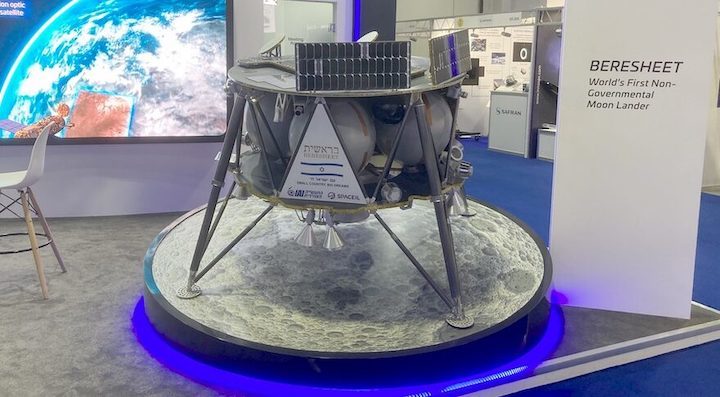3.11.2021

A model of the original Beresheet lander on display at IAI’s booth at the International Astronautical Congress in Dubai. Beresheet 2 will use a very different design, with two smaller landers and an orbiter. Credit: SpaceNews/Jeff Foust
DUBAI, U.A.E. — The company that built the first Israeli spacecraft to attempt to land on the moon is starting work on the second mission with a significantly different design.
Israel Aerospace Industries (IAI) was the prime contractor for Beresheet, the lander it built for the nonprofit organization SpaceIL, one of the competitors of the former Google Lunar X Prize. Beresheet attempted to land on the moon in April 2019, but its main engine shut down prematurely during its descent, causing the spacecraft to crash. A later analysis found that one of two inertial measurement units on the spacecraft shut down during its descent, and the process of restarting it caused resets in the lander’s avionics that caused the engine to shut down.
After some initial uncertainty about its future plans, SpaceIL is moving ahead with a Beresheet 2 mission, and will once again have IAI build the spacecraft. However, Beresheet 2 will be significantly different from its predecessor.
“SpaceIL came up with a very interesting idea: let’s land twice,” said Shlomi Sudri, vice president and general manager of the space division of IAI, in an interview. “We’ll develop an orbiter that will carry two small landers.”
As currently envisioned, the combined spacecraft will go out to the moon and enter orbit. The orbiter will deploy the two landers to attempt to land in different parts of the moon, then perform an imaging mission that could last for several years.
Work on the mission design started half a year ago, he said, with the orbiter recently passing its preliminary design review. The spacecraft will take about three years to develop.
Each of the landers will be “much smaller” than the original Beresheet lander, which weighed 585 kilograms at launch, but he did not give a specific mass. The overall spacecraft, including both landers and the orbiter, will combined weigh a little more than Beresheet.
Sudri didn’t discuss details about the Beresheet 2 landers’ design other than it will be different from Beresheet. “We’re practically doing a new design because of the mission and the size,” he said. “But it is based on components that were very reliable on the earlier mission. And, of course, the landing process will be improved.”
IAI is handling the design of Beresheet 2 while SpaceIL works to bring in new partners for the mission. That includes a memorandum of understanding between SpaceIL and the U.A.E. Space Agency announced Oct. 20 during “Space Week” events at Expo 2020 Dubai. Under the agreement, the U.A.E. will develop instruments to fly on the Beresheet 2 landers, although officials from neither country elaborated on the instruments proposed for the mission.
Quelle: SN
